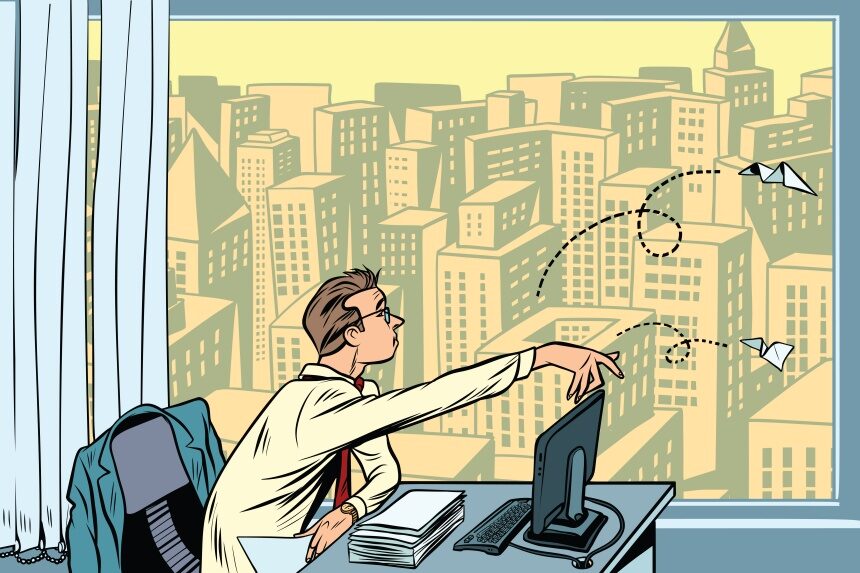Work is boring.
I expect many of you will disagree. You’ll offer your job as a counterexample. Or, if yours isn’t much to brag about, you’ll come up with hypothetical scenarios that show that work isn’t always boring. Spectacular as they may be, mental gymnastics of this sort prove nothing of consequence. I rule out the possibility of some exotic work that’s meaningful, enjoyable, stimulating, and not boring for a simple reason: It doesn’t exist.
Work — all of it — is boring.
Work is enforced labor, required by our needs and demanded by others. To work is to do what one does not wish to do. Or more carefully stated: Work involves doing things that we wouldn’t have otherwise chosen to do. What we do at work (and, importantly, how we do it) isn’t what we would have done if we didn’t have to work. Work is a sacrifice, the forced choice to give up the pursuit of our possibilities.
Decades ago, the Existentialists tried to convince us that life is a perpetual project of reinventing oneself. To live is to be free, and our existence is an ongoing, personal project of growth and self-discovery. What was uttered by lips holding cigarettes in Parisian cafés was eerily similar to popular articulations of the American dream today. We’re told that existence is ours for the taking. We’re asked to believe that life is a tree that continuously grows — each branch, twig, and leaf a choice that we can in principle make.
But such a conception of human existence proves no match for the harsh realities of capitalism. The necessity of work that’s born out of the global system paints a much grimmer picture. Because of our material needs, work forces us to give up our freedoms. Our life is no more — if it ever were — a flourishing tree of possibilities. Work is destitute, the death of choice. Thus, if life is choice, as many seem to think, then “working life” is an oxymoron. The more we work, the less we get to live. This is the real reason why work is harmful. Even if isn’t physically or mentally taxing, work hurts us existentially. It restricts our freedom to be anything but bored.
Boredom is the emotional realization that we are not properly cognitively engaged. Boredom, in other words, is what we experience when we wish to, but are unable to, find satisfactory engagement. Lack of proper cognitive engagement could occur when we have absolutely nothing to do. But such poverty of stimulus is rare. Most of the time, we have things to do. In fact, it’s in the midst of those doings that boredom most commonly arises. There are requirements and deadlines. There are objectives and quotas. There are commutes, emails, and Zoom meetings. There are bosses and colleagues. There’s extra work and unpaid labor. We push boxes, make lists, serve people, answer phones, send emails, and drive around. All while wishing that we were doing something else.
When U.S. adults are asked by researchers about their emotional experiences, they report that they commonly experience boredom during work. Survey after survey corroborates this conclusion: disengagement, dissatisfaction, and ultimately boredom are basic constituents of our working life. For instance, a Gallup survey dedicated to understanding and improving employee engagement found that 85% of employees worldwide are either not engaged or are actively disengaged at work. Another survey conducted in 2018 by Korn Ferry, a global consulting firm, found that boredom is, in fact, the top reason why employees seek a new job.
If you need further proof of boredom’s reach in the workplace, just visit the infamous r/antiwork subreddit — an active online community of more than 2 million users dedicated to exposing and undermining the exploitative and hierarchical relationships that define contemporary labor.
All of this demonstrates a clear pattern between work and boredom: the former curbs our freedom; the latter is our emotional reaction to our inability to pursue our freedom. Work is thus thoroughly characterized by the presence of an unfulfilled desire. While working, we crave something other than what is available to us. Our tasks and activities don’t cognitively engage us. They aren’t meaningful to us. They don’t capture our attention. In short, they aren’t what we want them to be. And so, we are bored.
But though boredom is a fact of working life, boredom with work is often, if not almost always, misunderstood. We are made to feel that boredom with (or during) work is our fault — the workers’ fault. “You’re just not doing enough.” “You’re not doing it the right way.” “You’re not being creative.” “You’re not thinking like a leader.” “You’re lazy.” We are told everything but the truth. The problem isn’t us; it’s work. Boredom isn’t a sign of laziness or apathy; it’s what it feels like to emotionally reject a situation that constrains our ability to be free.
So, what are our options when faced with the inescapable boredom of work?
We can submissively accept it. The need to work isn’t going away and not everybody can afford to quit their job or reach FIRE (Financial Independence, Retire Early). Work is many things. It is tiring, stressful, depressing, painful, and even dangerous. So what if it is also boring?
Or we can try to make work less boring. We can take breaks, change our routines, spice things up, or gamify our tasks. We can even demand distractions, entertainment, or a Google-like workspace with pool tables, bowling alleys, and other perks. Even if we can’t get rid of boredom altogether, we could at least try to experience it sparingly and between activities that are fun.
The lack of satisfaction that is endemic to boredom is its greatest tool. We are pained by boredom and precisely because of that, we are pushed to undo its cause. Boredom, in other words, is a powerful motivator. It’s a catalyst for change: an emotional force that propels us to pursue projects that could eventually relieve us from the absence of satisfactory cognitive engagement and the suffocating constraints that work imposes on us. This is no small feat, of course. It demands tremendous effort, both at the individual and collective levels. Collective and often disruptive action is key. Better and fair pay, reduction of working hours, and better working conditions are the victories of hard-won battles that involved coordinated action, pain, and sacrifice.
A revolt against work requires that we recognize work for what it really is: an exploitative social structure that harms us existentially, psychologically, and physically. The revolution demands that we accept that work is not the origin of self-worth, value, and meaning. To systemically transform work and to protect ourselves from its harms, we must first undo its false allure. What better way to do that than by acknowledging that work is profoundly and inherently boring?
Become a Saturday Evening Post member and enjoy unlimited access. Subscribe now




Comments
The article on boredom and work was a waste of good print space. Please seek authors who can inspire, inform and communicate ideas to the majority of your reading clientele.